-
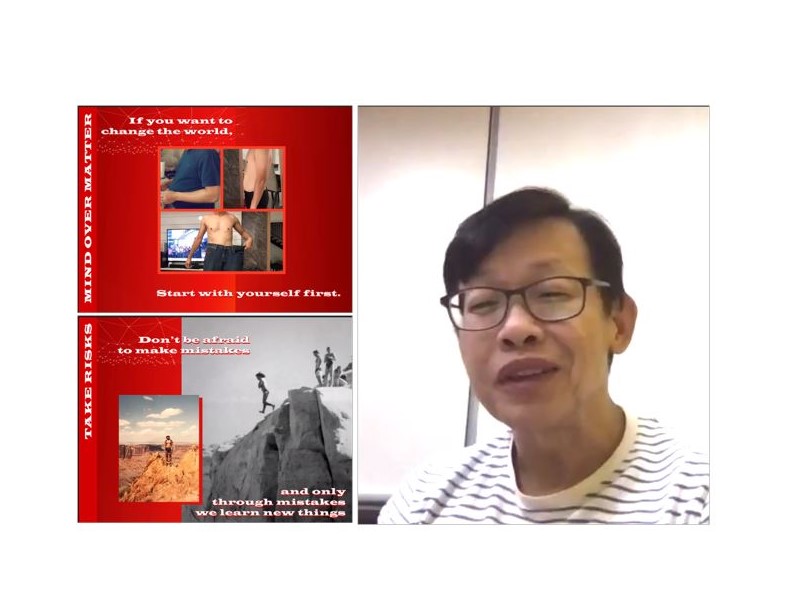
Mr Stuart Tan shared his story of how he went from having zero (and even being in debt) to building a successful career in technology products, proving that big dreams and hard work pay off.
-
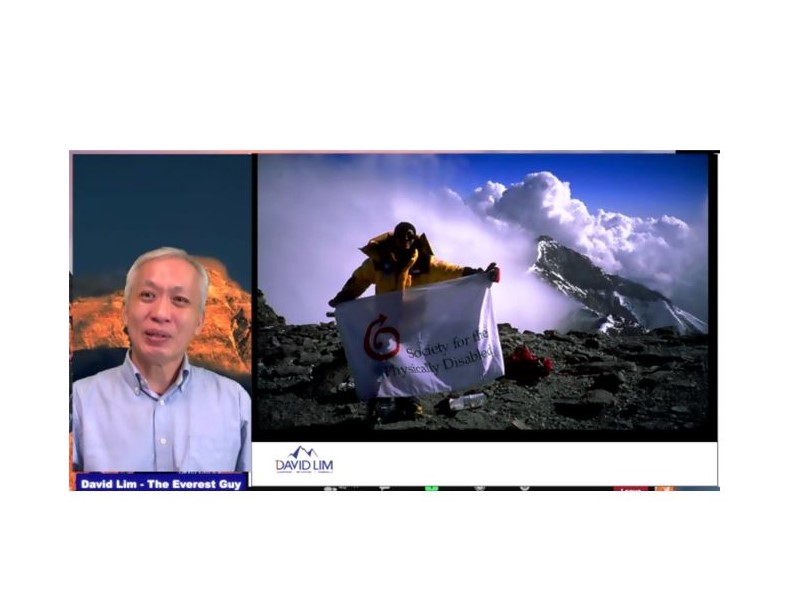
Mr David Lim told his story full of ups (geographically) and downs (physically), and left the audience in awe of his tremendous resilience.
-

Participants networked with each other in breakout rooms, and bombarded the two speakers with questions!
-
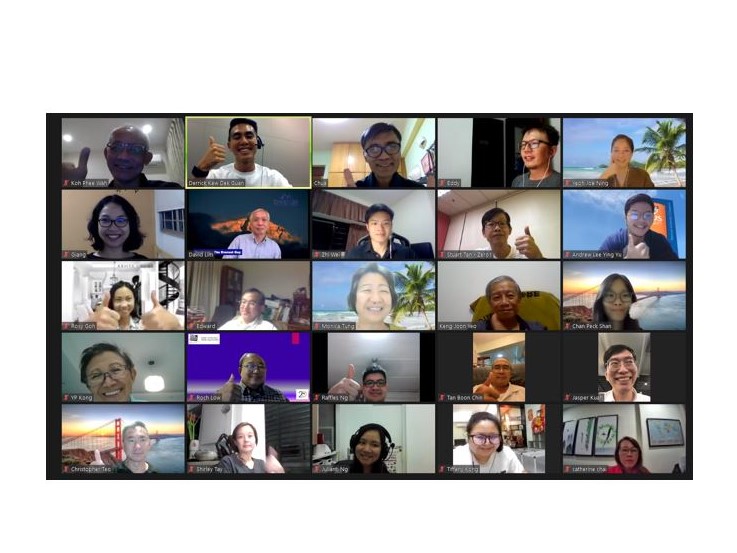
At 9pm on a Friday, the audience still looked full of energy.
-
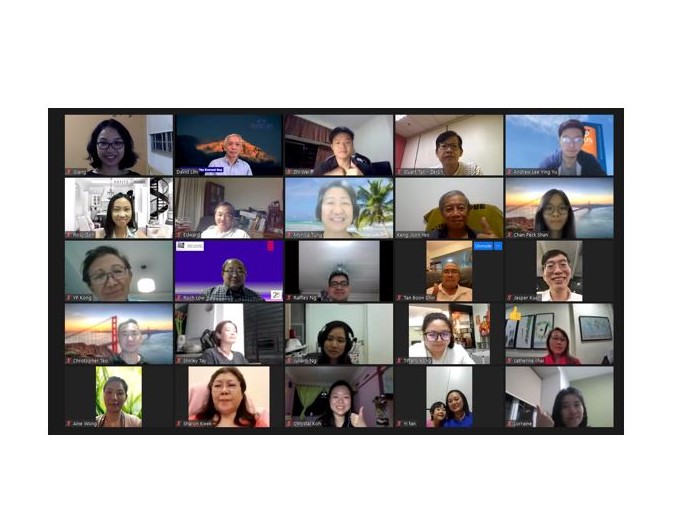
There were overwhelming requests for more of such events!
-
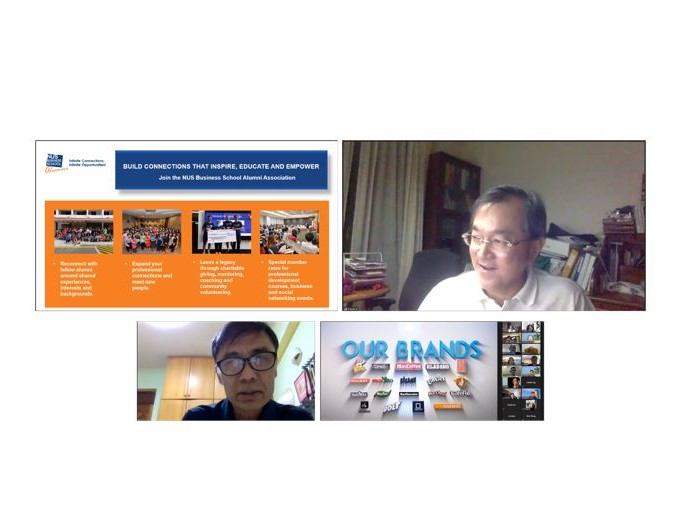
Everyone learned more about NUSBSA as well. Director Edward Ta elaborated more on the modern association, while Director Chua Hung Meng shared a side story about the association's history and founding member.
-

The organising team also experienced ups and downs in the 2-month event preparation period. With determination, they made it!
NUSBSA Webinar – “Looking Up & Down for Success” – Nine Lessons to Thrive In Life
11 December
“How could they have succeeded in life, from nothing?!”
“How can I apply the lessons learned from their success to thrive in such time of extreme uncertainty such as now?”
An audience of over 60 people heard from two eminent speakers, Mr Stuart Tan, Founder and CEO of Zero1, and Mr David Lim, Everest Expedition Leader, Author and Leadership Coach, on these two topics while networking and expanding their connections during a two-hour Zoom talk — “Looking Up & Down for Success” — organised by the NUS Business School Alumni Association (NUSBSA).
The Nine Lessons Shared and Extra Lessons from Conversations with the Audience
Dream, and dream big
One tends to either wait for or keep searching for sources of inspiration, but dreams indeed take root in understanding, or as David put it, “Why we do what we do”. David had a strong belief in his goal to climb the world’s highest mountains, set this as a “stretch goal” and decided to take the necessary steps to reach success. He adjusted his belief system to accomplish his goals, rather than limited it to what seemed feasible or attainable.
Take actions
Ambitious goals can be daunting to most people, leading most to give up along the way. David adopted the 1% rule, i.e. developing clear and incremental actions to move towards one’s ultimate goal, so as to ensure that a dream gets translated into a blueprint rather than just a theoretical concept. After all, with just 1% improvement each day, we can be twice as good as today after just 70 days! David began his journey by independently climbing a small mountain, fully aware that his longer-term goal was to conquer Mt. Everest. While encouragement along the journey is always welcome, success ultimately depends on intrinsic self-belief and motivation. At a time when the concept of skywriting was alien to many, Stuart kept faith and persevered with his business in the US, which was one of his first overseas companies.
Manage resources
Another key element of success is to manage resources efficiently and effectively, with one of the most valuable resources being a team to provide support and assist in execution. One should build a team and take ownership of the task at hand, bearing in mind the importance of leading from the front and making hard decisions. As Stuart said, making a bad decision today might be preferable than making a good decision tomorrow. A leader must also be able to maintain high levels of morale for the team. One way to achieve this, as also observed by David in his mountain climbing team, is to set clear checkpoints for the team to demonstrate progress in meeting the end objective.
Manage risks
Risks can lead to failure, but at the same time the fear of risks can negate any possibility of success. It is commonly said that one should take risks, yet a more accurate message might be to take “measured” risks, considering the availability of support as well as an objective and realistic assessment of the existing circumstances. At the same time, it is also important to work with the circumstances and resources one has, rather than those that one would like to have. Fully aware of the risks they were to assume, both Stuart and David thoroughly evaluated the skills they had, the financial or other resources they could rely on, and the support from their family members and friends, before making any critical moves.
Overcome failures
One should not fear mistakes and failures, but it is also vital to ensure that one can manage when such events materialise. One should adopt a positive attitude towards setbacks and be able to identify both areas of success as well as the necessity of improvement. To Stuart, his team was able to pick themselves up despite various setbacks due to resilience and persistence in following their beliefs. A positive mindset, rather than dwelling on failures, is also important. As David mentioned, “Spectacular failures make life interesting”. From a leadership perspective, leaders need to recognise that change and failure are inevitable, but they can lead their team to navigate such situations rather than allow themselves to be led by the circumstances around them. This can be done by having clarity on the mission at hand, and providing clear and decisive leadership to their team.
Manage success
Beyond failure, how then to deal with success? Most would recognise the importance of managing setbacks, yet success can often be a more dangerous foe by causing one to lapse into complacency and rely on previously-used strategies. While one should take pride in success, one should also treat them as how they do setbacks, i.e., as a case study to identify areas of improvement. One should also view success as a foundation stone that should be built upon, by finding their next objectives and goals. It was exactly this mindset that brought David from one high mountain to another and Stuart from one successful company to the next.
The event was organised by a team, formed in early October 2020 and masterfully advised by Edward Ta ('87), comprising Raffles Ng, Rosy Ooi ('88), Pang Jun Xiang ('17), Derrick Kew ('17) (also the emcee), and Giang Nguyen ('13).
The organising team would like to give special thanks to:
- NUSBSA Board of Directors: Mr Chua Hung Meng ('81); Mr Roch Low ('84); Ms Catherine Chai ('92); Mr Koh Phee Wah ('84); Ms Winnie Cheah ('92); and Mr Yeo Keng Joon (MBA '85), the founding ex-NUSBSA President, for their tremendous help, advice, and support;
- NUSBSA Administration Executive, Ms Ivy Tan;
- BizAlum; and
- Corporate sponsor Food Empire, founded by an NUS alumnus, for their generous support.
Submitted by Ms Giang Ngyuen.
- Alumni Group - NUS Business School Alumni Association